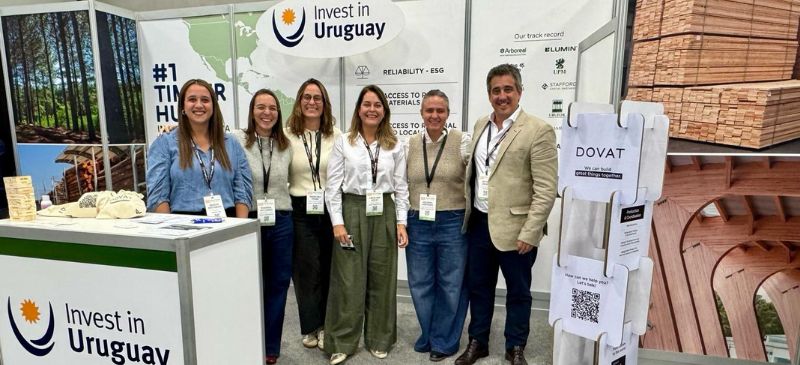- Home
- About us
- News
- Events
- EXPORT Export
-
BUY
Buy
Buy
- INVEST Invest
- COUNTRY BRAND Country Brand
-
INFORMATION CENTER
Information center
InformationCenterInformationCenterReports Country reports Department reports Foreign trade reports Product-Destination worksheet Sectors reports Work documentsStatistical information Classification Uruguay XXI Exports Imports Innovative National Effort Macroeconomic Monitor Tools Buyers Exporters Investors
- Contact
-
Languages
Uruguay Showcases Forestry Development at World’s Largest Wood Construction Event
Participation in the Mass Timber Conference 2025 reaffirmed the country’s appeal to investors in the forestry sector. Companies from Finland, Japan, Brazil, the United States, and Chile already trust the Uruguayan model, with investments worth hundreds of millions of dollars
Share:

Since 2019, Uruguay has attracted international capital exceeding US$650 million, consolidating its regional leadership as an investment destination in the wood and pulp industry.
In this context, Uruguay XXI, the government investment promotion agency, participated in the Mass Timber Conference 2025, the world’s largest event focused on wood manufacturing and construction, held March 25-27 in Portland, United States.
The agency had a country stand from which it promoted Uruguay’s opportunities in developing mechanical wood processing, sustainable materials, and the construction industry. Uruguay XXI’s presence at this conference was part of Uruguay XXI’s efforts to position the forestry-wood sector internationally as a strategic area for attracting long-term productive investment.
This positioning strategy responds to a trend of growing investor interest in the Uruguayan forestry model, as evidenced by the operations recorded in the last year. In 2024, one of the most significant investments was made by Oji Holdings, the Japanese pulp and paper giant, which announced the creation of Oji Uruguay Forest Company S.A.S. to acquire forest plantations in the departments of Tacuarembó and Rivera for US$ 288 million. The operation includes assets previously managed by The Rohatyn Group (TRG) and marks a milestone as the most significant Japanese investment in the forestry sector in Uruguay.
Another notable investment was the inauguration of a new Kluntex sawmill plant in Rivera, worth US$8 million. This plant will add 7,000 m³ of pine wood to its monthly production. This US—and Chilean-owned company generated 200 direct jobs and reinforced the dynamism of northern Uruguay.
The year also saw progress in Lumin’s expansion. In 2023, it invested US$136 million in a new high-value plywood panel plant, strengthening its regional leadership in the production of internationally certified plywood.
For its part, Arboreal, a company that burst onto the scene in 2021, has been key to the sector’s technological leap. With nearly US$60 million investment, it implemented the largest solid wood production plant in South America, based on CLT and Glulam technologies. This infrastructure allows for the export of structural components for high-rise buildings, which aligns with global trends in sustainable construction.
Why invest in Uruguay?
The 2025 Forestry Report prepared by Uruguay XXI explains that the country offers investors legal certainty, macroeconomic stability, and a highly favorable legal framework. The laws on investment promotion, free trade zones, and sectoral incentives guarantee tax benefits, clear rules, and free movement of capital.
In addition, Uruguay has first-class infrastructure: specialized ports, an expanding road network, and the Central Railway project—which connects the forest interior with the port of Montevideo—reinforce its logistical competitiveness.
Sustainability is a cross-cutting theme in the development of Uruguay’s forestry sector. More than 90% of the country’s commercial plantations have international certifications such as FSC and PEFC, which endorse responsible forest management practices. This environmental traceability allows access to demanding markets such as the European Union and the United States and reinforces the country’s commitment to climate change mitigation. Added to this is the growing interest in carbon capture and biomass energy generation projects, which position the sector as a key player in transitioning to a low-emission economy.
The availability of certified raw materials, a clean energy matrix, a transparent institutional environment, and skilled human capital complete the picture. The country produces more than 17 million m³ of wood annually, a growing portion of which is destined for high-value-added industries.
Cellulose, the country’s main export product, generated US$ 3.007 billion in 2024, representing a 27% increase over the previous year. China and the European Union are the main destinations.
Uruguay combines fluid access to international markets with a stable regulatory framework and an active sustainability policy. Its forestry model, which integrates globally recognized environmental standards and generates significant productive linkages, has been one of the keys to attracting long-term investment. In the growing demand for renewable materials and clean energy, the country is consolidating a competitive position that responds to the new needs of global trade.
